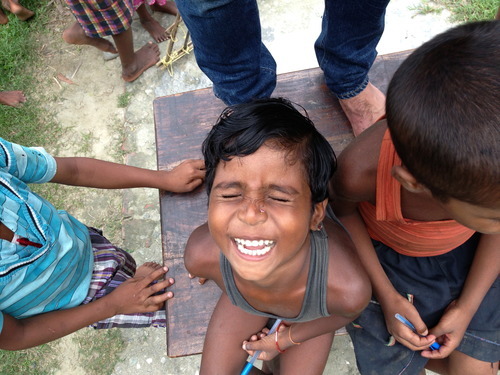
By Siddhi:
Last May, as I was catching up with a dear friend on the phone, she said the following in response to an unusual lack of passion in my voice about my summer plans, which entailed office internships highly validated by my peers, family, and advisors, but not by heart:
“Siddhi, just remember that when you die, you leave your money behind.”
Partially because of her words, and partially because I knew it was time to step away from what was expected of me and go find what made me come alive, I took a risk. I turned down three internship offers to realign myself with what I find inherently valuable in life, and took off to rural India for the summer to devote my time to something larger than myself. In Bihar with SEEKHO, I was daily amongst team that embodied optimism, faith, synergy, and most crucially unwavering mutual values. Here are 5 life lessons I learned from this beautiful team of dreamers that I truly believe could help all of us become collectively more fulfilled human beings:
- Make “career goals” more synonymous with “life goals”. In a fulfilled life, the two should never be mutually exclusive.
- Rationalization is a sign for change. When you have to continually justify to yourself why you’re doing what you’re doing, maybe it’s time to take the risk you never took because you were too scared of what would happen if you did.
- Stop crafting your life narrative in reverse. Instead of taking steps that assure reaching a validated end-goal, take steps that bring meaning to each day. This way, the sum total of fulfilled moments in your life aggregate to something significant, even if you end up somewhere you never thought you’d be.
- Creating social value does not and should be defined exclusively as service to the poorest of the poor. Social impact, as I’ve defined it after my India trip, is something that begins with social consciousness. If we can actively frame our thinking and behavior with mindsets more acutely tuned to what exists beyond the standard bottom line metric, to the point that concern for collective well-being becomes a norm, we are already engaging in meaningful work in the social impact space. While packing our bags and heading to resource-starved rural landscapes can undoubtedly breathe rare perspective and vitality into our living, this sort of behavior is in no way a prerequisite in becoming more thoughtful, empathetic, and giving people. Bill Clinton wrote a short book, more of a manual, called Giving, in which he collects many macro but also micro-level efforts of generosity that have transformed communities for the better. It’s worth skimming at the least to understand that you don’t need a plane ticket, physical grit, and firsthand access to poverty to make a difference. Rather, by making a day-to-day commitment to infuse love, positive energy, and even basic giving into the lives of those around us, we can become enriched individuals who thrive in more fulfilled societies rooted in compassion. Every, single one of us is capable of this regardless of where we live, how busy we are, or how much money we have.
- The world doesn’t need more cynics. While I am not discrediting certain forms of cynicism as hypothetically constructive to keep people grounded, when it comes to tangible social development, or for that matter, anything driven by an innate belief in improving humanity, cynicism kills drive, it kills risk-taking, and it most awfully kills faith, which is what I have over the last month discovered is most imperative to the success of any vision of meaning, no matter how farfetched. Faith in who you are serving, why you are serving them, and an unwillingness to ever draw a finish line to giving is what allows passionate people to fulfill objectives that, at their onset, often seem like pipedreams. I have found that while this faith is very much internally derived, it is also incubated by teams of dreamers who share common visions but approach them with uncommon strategies, which creates a dynamic where no one individual’s reservations is enough to pull a whole dream down. Where do you find that team? Values. If you unite with people not because of where they work, how much money they have, or how likely they are to do things for you but rather because of a shared value base, there is little in the moral compass of your shared vision that you will end up regretting. Values are the glue of all relationships, but especially relationships that in some way leverage kindness, empathy, and social good. You can go wrong in logistics and operations, but if you share a core value system with the people you work with, what will rarely go wrong is the heart of what you do. As long as there’s heart, there will be never be failure. The final point I’d like to bring up is one addressed by my uncle while we were in Calcutta on the way to Bihar. He told me something not a single person has told me in my life: “For the first few years of your career, take a job that makes you just a little bit of money, enough to handle your basics, but not too much to get used a level of living that becomes impossible to leave afterwards.” This is hands down the most valuable piece of advice I’ve ever received, and will, I’m sure, be something I always reference to keep myself attached to what I believe in.
So close your eyes and ask yourself: Is what I want to do next more inherently valuable to me than what I’m doing now? If the answer is yes, and makes your heart pound just a little harder than it just was, embrace what your soul is telling you and live life in forward.
